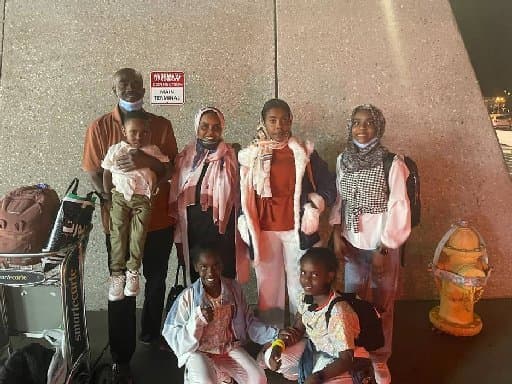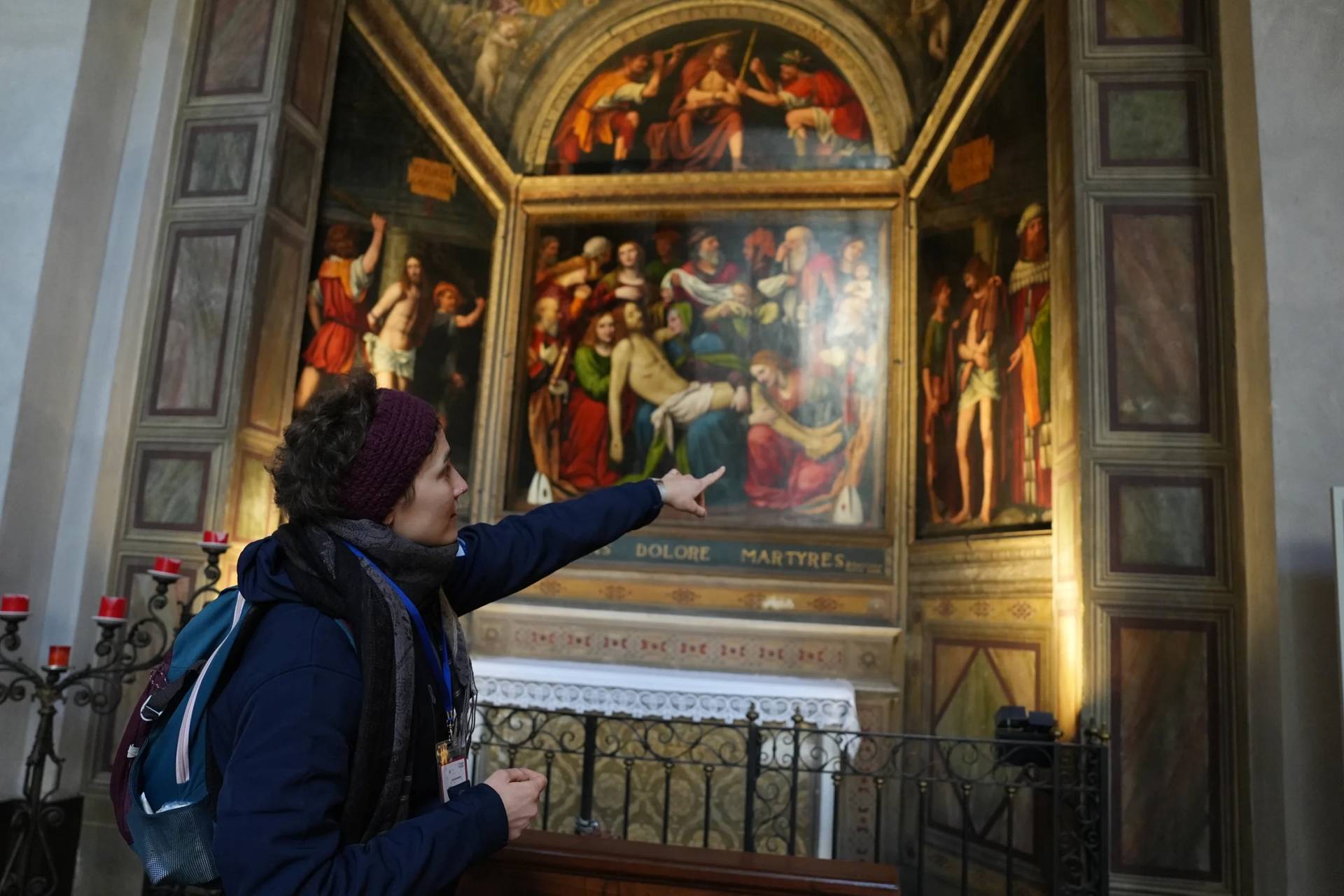ARLINGTON, Virginia — The stream of refugees and other immigrants into Northern Virginia in the past year has been nonstop — but the staff of the Diocese of Arlington’s Catholic Charities Migration and Refugee Services has kept up with the unprecedented need.
The resettlement ministry has welcomed more than 1,000 newcomers since October. It has restructured and almost doubled the size of its staff from 33 to 62, even opening a new office in Woodbridge, Virginia, to accommodate the influx.
“The response of the community has been overwhelming,” said Belayneh Loppisso, director of the diocesan agency, one of three resettlement agencies in Northern Virginia.
He said parishes and donors from all over the diocese have generously responded to Amazon wish lists and other collections, providing food, furniture and household necessities.
In addition to its regular immigration streams, the agency last August began resettling hundreds of Afghan families who fled to the United States for safety after the fall of Kabul.
In October, the government granted humanitarian emergency status to 78,000 additional refugees.
Since Oct. 1, the beginning of the current fiscal year, Loppisso said his staff has resettled more than 850 Afghan parolees — those granted emergency humanitarian status — in addition to about 150 Afghans holding Special Immigrant Visas, most of whom had assisted the U.S. government’s mission in Afghanistan.
According to Catholic Charities USA’s most recent annual survey, 12,000 Afghans were resettled across 36 states, including Wisconsin, where Catholic Charities in the Diocese of Green Bay helped resettle 127 Afghan refugees in the Green Bay area in the past year.
In that diocese on June 20, World Refugee Day, Catholic Charities leaders used the opportunity to welcome Afghan refugees to their new community and to thank all the local agencies who helped make their resettlement possible.
During a World Refugee Day celebration at Resurrection Church in Allouez, Wisconsin, Karmen Lemke, Catholic Charities director, welcomed many of the refugee families as well as community and government agency representatives who played a role in resettling Afghan refugees.
“To be honest, we did not fully understand what we were being asked to do or what we were saying yes to,” Lemke said in her opening remarks. “But I could tell you we would never change the direction we were going.”
The celebration, which drew about 150 people, included remarks from Green Bay Mayor Eric Genrich and a letter of gratitude from an Afghan refugee read by Tara DeGrave, Catholic Charities associate director/child and family services manager.
World Refugee Day is an international day designated by the United Nations to honor refugees around the globe. The observance has been celebrated locally in past years by Catholic Charities, but this year’s event — just months after a whirlwind of activity to resettle Afghan refugees beginning in September 2021 — was a more poignant celebration.
“Today, as a result of us saying ‘yes’ together as a community, I’m proud to say that we have welcomed 127 individuals and family members, many of them who are here tonight, to the Green Bay area,” Lemke told guests. “So, first and foremost I want to take a moment to acknowledge and welcome our newest neighbors and celebrate their arrival here.”
In his address, Genrich thanked the Catholic Charities team for “everything they’ve done to roll out the red carpet for our refugees.”
“The mission that Catholic Charities is living is something I’ve been exposed to all of my life, as somebody who is baptized and confirmed Catholic,” he said. “Welcoming the stranger is really an important part of Catholic teaching. The importance of hospitality is the cornerstone of all great religions and all great cultures and something I believe very strongly in and something that we are trying to live in the city of Green Bay.”
DeGrave read a letter written by Arash Sultani, an Afghan refugee who is now employed by Catholic Charities as an immigration counselor who helps fellow Afghan refugees.
“Me and my family are among those who arrived in Green Bay September of last year,” Sultani wrote. “The journey wasn’t easy … but the fear of dealing with some illogical beings … made me and my family want to try hard and make it. Here we are today, seeing and thanking the possibility.”
While the challenges of escaping violence in his native country were great, Sultani wrote, the welcome he and his family has received has made it all worthwhile.
“Green Bay is beautiful and hospitable, but all the new looked a little bit overwhelming at first,” he wrote. “But I believe it was all worth it and will always be because right now we are away from war. We also feel secure economically and can build and plan our hopes for the future — something that has not been possible throughout all of these years in Afghanistan.”
More than 100 Catholic Charities agencies in dioceses across the country are serving migrants and refugees, according to Catholic Charities USA, the Alexandria, Virginia-based national office of 167 local diocesan Catholic Charities agencies.
The local agencies assisted 608,000 migrants over the last year.
In the Arlington Diocese, Catholic Charities has been welcoming newcomers from around the world since 1975, but Loppisso said this year’s numbers have far surpassed the previous peak of about 700 to 800 individuals in 2017, before government policy curtailed immigration.
He told the Arlington Catholic Herald, the diocesan newspaper, that the number of immigrants in 2020 was about 400, so staffing had been down before numbers started ramping up again.
In addition to the Afghan refugees, the agency has helped resettle about 55 refugees and immigrants from other countries, including El Salvador, Honduras, Guatemala, Nicaragua, Sudan, Ethiopia and Congo.
Loppisso said one of the most recent arrivals to the diocese is a family of Sudanese refugees displaced years ago by Sudan’s civil war. They arrived at Dulles International Airport in June, after staying in Egypt for the past 20 years while awaiting approval to join relatives in Fairfax County, Virginia.
In addition, Loppisso said a few refugees from Ukraine also have started to arrive in Northern Virginia after the U.S. government announced plans in March to welcome up to 100,000 Ukrainians and others fleeing Russian attacks.
Most of those arriving in Virginia are sponsored by family members who live here and petitioned to have displaced relatives join them.
“When they get here we are authorized to provide services,” Loppisso said.
With federal funds and local donations, the agency provides a wide range of migrant services, including employment and housing assistance, mental health, youth and senior services, English and other education classes, including technology, student programs and cultural integration for families.
Although many of the immigrants have professionals skills, they often must take entry-level jobs to begin earning an income when they first arrive.
But families are grateful simply to have left the dangers back home and arrived safely in this country. “Safety is the first priority, and they really are thankful for that,” Loppisso said.
He added that case managers and other staff take “a holistic approach” to helping families acclimate to their new culture, and five different staff members might work with one family in the first 90 days, helping them with housing, jobs, school registration, health requirements and other needs.
Jessica Estrada, director of newcomer Services for diocesan Catholic Charities, noted that many of the agency’s staff “know all too well the journey of migration, as they were once newcomers themselves.”
“They can speak to why this is important not only for our clients, but also for our diocesan family. ‘Welcoming the stranger’ is a long-standing, biblical tradition of the church,” she said, which “not only enriches our own faith journey but also provides new insight into the ways our world is interconnected.”
– – –
Miller is a staff writer at the Arlington Catholic Herald, newspaper of the Diocese of Arlington. Contributing to this story was Sam Lucero, news and information manager of The Compass, newspaper of the Diocese of Green Bay.












